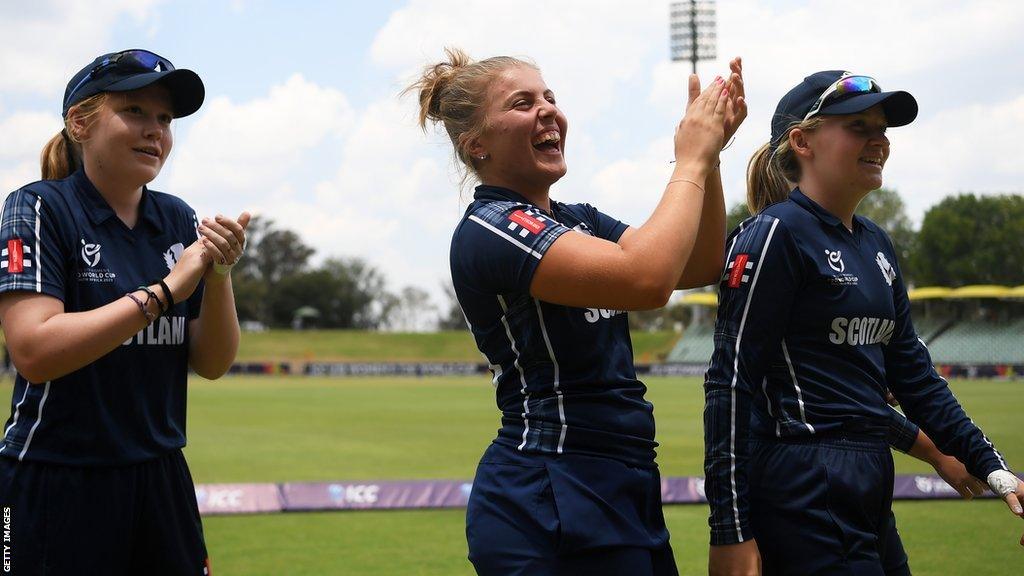Scotland cricket: Lorna Jack on World Cup ambition
- Published

Wicketkeeper Ailsa Lister (centre) is one of the nine players awarded a professional contract
Scotland batter Lorna Jack says getting to a World Cup is the "main aim" for the national women's side given nine players have been awarded their first professional contracts.
Scotland have never reached the game's showpiece but the Under-19s made it to the inaugural World Cup last winter.
From that squad, Katherine Fraser, Ailsa Lister and Orla Montgomery are three of the players to get contracts.
"We have more time, more facilities and more backing," Jack, 30, said.
"We need to have that backing and then use it in the tournaments we go to," Jack, who also keeps wicket, told the BBC's Stumped podcast.
"We don't play a lot of international cricket at the moment, we've got a few tournaments coming up, hopefully one of them will be a World Cup qualifier, and we want to go there and win the qualifier.
"Getting to a World Cup is the main aim, and if we can do that, then we're putting Scotland on the map as a cricketing nation. The men are already doing that, we need to be pushing for that as well, and with these contracts we can do it."
Jack is employed as a police officer and spoke candidly about how her work has impacted her cricket.
"When I started my job it was really difficult to balance - it ran me down quite a bit, and impacted my health," she added.
"I had to start making hard decisions - saying after a night shift that I'm not coming to do a fitness test, which you then stress about whether that makes you available for selection. You have to think about what's better for you at that time.
"The contracts have allowed me to take a day off - obviously reduced hours, reduced money - but you're compensated for that through Cricket Scotland and through the contract.
"It takes a bit of pressure off, because there are some days in the police where you don't deal with very nice things and it can be hard mentally and physically to then go to training and give 100%."
Although the contracts are not full time, and the nine women will continue to work or study alongside their cricket, Jack believes it is an important step and that they provide players with a healthier work-life balance.
"They are part-time contracts, but it helps because most of us are in full-time employment or are students or part-time employment. No-one on these contracts has been a full-time cricketer at any point," she said.
"Hopefully for some of the girls that will come in the future, for me probably not, but it just allows us to have the monetary backing to take a few hours off work, or for me, a full day of work. It's allowing us to train a bit more, and a bit more effectively."
Jack has seen the women's game develop significantly during the course of almost 150 appearances for her country since her debut in 2007.
"I started really young, and have seen it progress from getting men's hand-me-downs, playing in extra large shirts - I'm 5ft so you can imagine how that went, especially in Scotland when it's windy - to now, getting our contracts," she added.
"It's been a journey, there are too many people to thank, but they all know who they are. To go from where we were to where we are now is incredible."

Will Wrexham get to the Premier League? A heartwarming look back at the history of the football club now owned by two Hollywood actors
Can you put ten British monarchs into the correct order? Test your memory with this fun challenge
